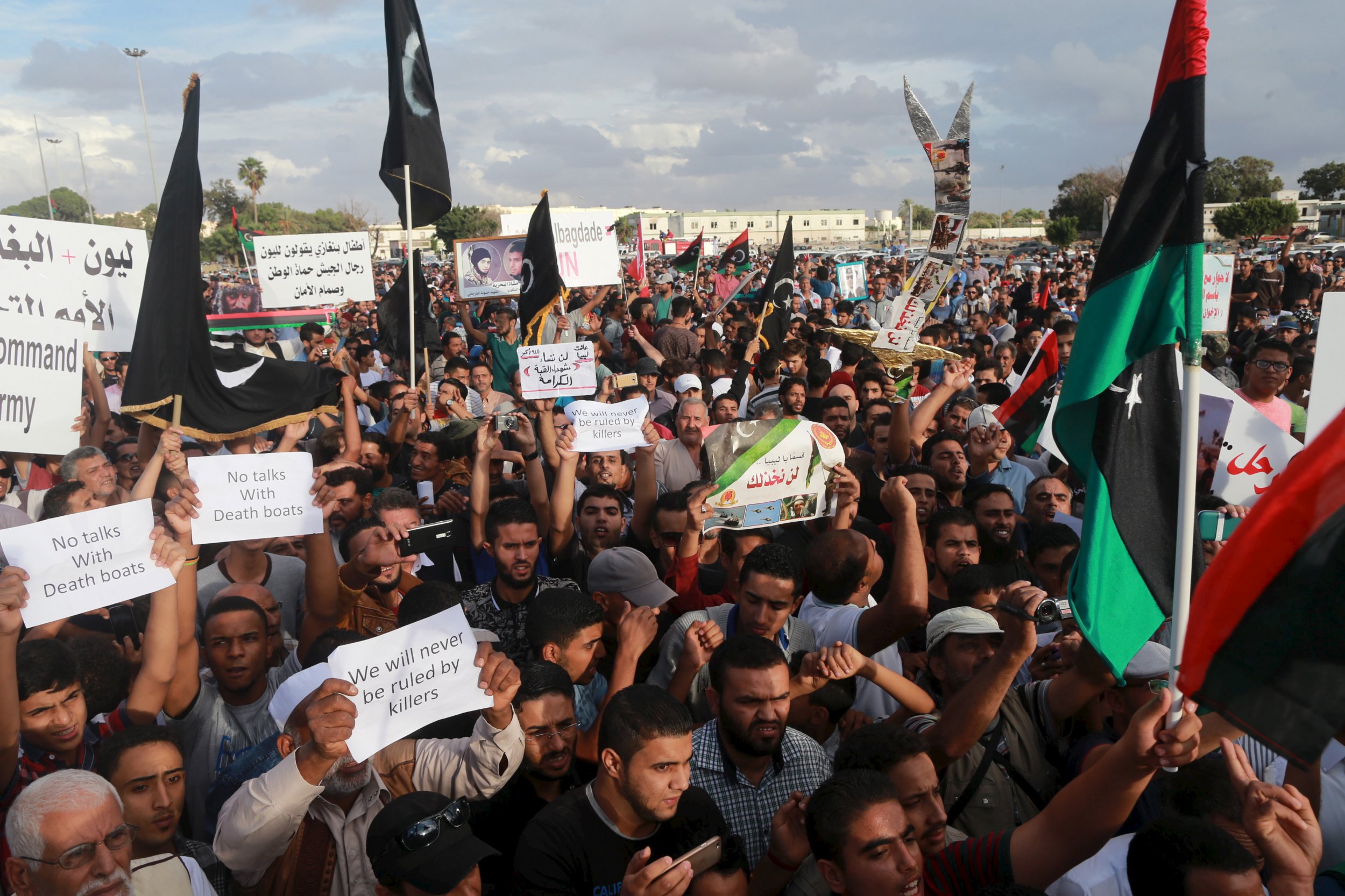
After a year of chaos and militancy, representatives from the two rival parliaments in Libya have signed a tentative agreement aimed at bringing about a national unity government, Reuters reported.
Lawmakers from the Libyan House of Representatives (HoR), based in Tobruk, and the Tripoli-based General National Congress (GNC) signed the declaration of principles in Tunis on Saturday. The agreement is separate from the U.N.-sponsored Libyan Political Agreement, a peace process which has so far struggled to prove acceptable to either side, particularly the GNC.
In the absence of a stable government, Libya has become a breeding ground for armed factions and militias, with the Islamic State militant group (ISIS) seeking to recruit fighters to its branch in the vast North African state. Newsweek reviews the current deal and speaks to experts to consider whether the new government can bring lasting peace to Libya.
Why are there two governments in Libya?
Instability has reigned in Libya since 2011, when an armed rebellion toppled long-time leader Muammar el-Qaddafi. A rebel leadership council took control of the country until the GNC was elected in 2012, then replaced two years later by the HoR. But following the election of the HoR, a coalition of Islamist groups and armed militias loosely affiliated under the name Libya Dawn elected their own prime minister and forced the HoR to flee Tripoli, relocating to Tobruk in the far east of Libya.
Since the HoR were democratically elected, they are often referred to as Libya's internationally recognized government, according to Alison Pargeter, senior research fellow on North Africa at U.K. think tank the Royal United Services Institute (RUSI). "You basically have one camp set up in Tripoli, the other based in Tobruk and Bayda, both claiming control over the country, both claiming they're the sole legislative powers, both now squabbling over a lot of the state institutions in Libya," says Pargeter.
What is the nature of the new deal?
The declaration involves establishing a 10-person committee—five members from each parliament—that would select an interim prime minister and two deputies, according to Reuters. Full legislative elections would take place within two years. The deal is preliminary and requires approval from both the HoR and the GNC before it can be implemented.
How is it different to the U.N. peace process?
The U.N. has been brokering peace talks between the two factions since January with limited success. The GNC has so far refused to put forward candidates for a unity government under the U.N. process, despite the international community insisting that it remains the only way forward in Libya.
Some see the new deal as a domestic response to that type of international pressure, according to Philip Stack, principal analyst on the Middle East and North Africa at global risk consultancy Verisk Maplecroft. "In many ways, this agreement is a reaction to the U.N. process, which has been a top-down agreement forced on the Libyans and which many people saw as unduly favoring the internationally recognized House of Representatives government," says Stack.
Will it bring lasting peace to Libya?
The U.N. special envoy to Libya, Martin Kobler, welcomed the agreement as a good first step, the BBC reported. But he insisted that the U.N.-backed Libyan Political Agreement represents the only means of uniting the country and requires "rapid endorsement" by both sides.
For Pargeter, the Tunis deal serves only as a "red herring and a sideshow to the main peace track" that is likely to complicate matters further. She doubts that it has the weight to bring about a long-term solution to Libya's political crisis. "The substance of [the Tunis deal] is very, very thin. It doesn't actually say very much," says Pargeter. "I think the agreement is just a page-and-a-half long."
Stack of Verisk Maplecroft agrees that "pacifying the country is going to be a long-term process," as armed factions continue to hold sway, and groups such as ISIS seek to capitalize on the lawless environment. He says that both parliaments will be reluctant to fully commit to the deal. "There have been so many false dawns in Libya that people are wary of new initiatives," says Stack. "Much will depend on whether the U.N. and the international community get behind it, or at least incorporate it into their process, and there is no sign of that yet."
Uncommon Knowledge
Newsweek is committed to challenging conventional wisdom and finding connections in the search for common ground.
Newsweek is committed to challenging conventional wisdom and finding connections in the search for common ground.
About the writer
Conor is a staff writer for Newsweek covering Africa, with a focus on Nigeria, security and conflict.
To read how Newsweek uses AI as a newsroom tool, Click here.








